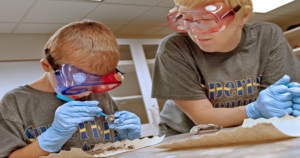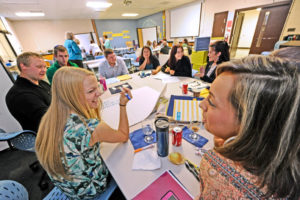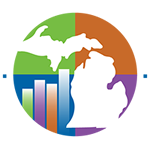School of Education
 Focused on Learners
Focused on Learners
The Lake Superior State University School of Education promotes the development of educational innovators who embrace diversity and are committed to the success of all learners.
Make a difference. Become a teacher at Lake State.
Develop your passion for education at LSSU. You will learn to inspire today’s youth as they become the next generation of successful citizens. You will gain a thorough understanding of teaching methodologies, develop deep knowledge of subject content, and learn to apply what you are learning in real classrooms.
LSSU offers aspiring teachers an opportunity to learn teaching methods through classroom coursework and practical application. Education students work in local classrooms during their first year at LSSU.
Learn more about the grades bands we prepare you for.
Early Childhood Education (Birth-Kindergarten)
Early Childhood Education (Birth-Kindergarten)
A track in Early Childhood Education prepares students to provide high quality education and care for children birth through age eight in a wide variety of settings. Graduates are qualified to work as teachers and directors in:
- Private early childhood programs
- State-funded preschool programs, such as Great Start Readiness Preschool
- Federally-funded HeadStart programs
Students develop their understanding of typically and atypically developing children through integrated coursework and field experience, as well as two semester-long practicums. The required minor provides the opportunity for students to explore a related field, adding to their knowledge and skills for working with young children and their parents, or expanding their expertise for employment opportunities.
Elementary Education (Pre-Kindergarten-3) and (3-6)
Elementary Education (Pre-Kindergarten-3) and (3-6)
The Elementary Teacher Preparation Program is highlighted by the interaction of content knowledge and pedagogical skills in effective teaching. Students will engage in clinical experiences throughout the program as they plan, deliver, and reflect on learning activities with children at the Pre-Kindergarten-3 and 3-6 levels.
A Year-by-Year Overview:
- Year One: Students will complete their initial professional coursework and start their general education requirements.
- Year Two and Three: Students will take content-specific courses in Literacy, Mathematics, Science, and Social Studies that focus on effective teaching in each of these subjects. Students will practice those skills in a Pre-Kindergarten-3 or 3-6 setting.
- Year Four: Students will complete integrated subject methods courses where they combine skills from previous courses to develop unit plans and teach lessons.
- Year Five: Student teaching, a semester-long culminating experience, is completed in the fall of the fifth year. Generally, this student teaching experience will be in the Eastern Upper Peninsula or in Sault Ste Marie, Ontario. The Michigan Test for Teacher Certification in the appropriate grade band must be passed prior to beginning student teaching.
Secondary Education (Grades 5-9, 7-12, 9-12)
Secondary Education (Grades 5-9, 7-12, 9-12)
The Secondary Education Program is highlighted by in-depth study in a subject major and a subject minor, extended field experience in secondary school settings, and focused development of the knowledge and skills critical for effective teachers. The program leads to a bachelor of arts or a bachelor of science degree in the student’s major area.
Secondary-level teacher certification in Michigan permits individuals to teach the subject areas, in which they hold endorsements, at grades 5-12. The subject majors and minors provide the required coursework for the related endorsements. Completing the coursework and passing the corresponding Michigan Test for Teacher Certification subject test enable graduates to meet the requirements of No Child Left Behind and to be highly qualified in their subject areas.
Subject major and minor options are listed below. Specific requirements for these are found in the appropriate sections of this catalog.
Majors
- English Language and Literature
- Integrated Science
- Mathematics
- Social Science
Minors
- English Language and Literature
- Mathematics
Students begin their studies in the secondary education program with a focus on general education requirements, an academic major and an academic minor. They complete the initial professional education coursework in their sophomore year and apply for formal admission to the program at the end of that year. By that time, they will have also passed the Michigan Test for Teacher Certification Professional Readiness Examination.
Upper-level professional education coursework, along with the completion of the major and minor, is the focus for the junior and senior years. Student teaching, a semester-long culminating experience, may be completed in the spring of the fourth year or the fall of the fifth year, depending on the individual student’s progress through the program. Generally, this student teaching experience will be in the Eastern Upper Peninsula or in Sault Ste. Marie, Ontario. The Michigan Test for Teacher Certification subject test in the major must be passed prior to beginning student teaching.
LSSU teaches you how to guide the children in your class towards a positive future. They help you build the foundation that turns you into a teacher who makes a difference in the lives of children.
Learn more about the College of Great Lakes Ecology and Education.


